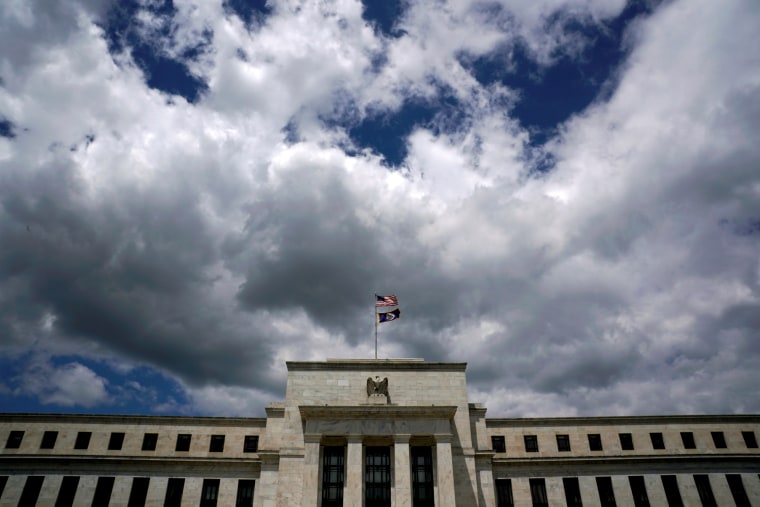For nearly four years, the Senate confirmation process for Donald Trump's nominees has generally been predictable and easy: the White House tells Republicans who to confirm, and GOP senators do as they're told, embracing the role of a rubber stamp.
But when it comes to the Federal Reserve, even the most obsequious Senate Republicans seemed willing to exercise at least some independent thought. When the president wanted to add Herman Cain to Fed's board of governors -- by any fair measure, a plainly absurd proposition -- GOP senators politely told the White House they simply couldn't go along with such a ridiculous choice. When Trump tapped Stephen Moore for the Fed, the same thing happened.
To a very real extent, it was reassuring to know even Senate Republicans, as sycophantic as they've been, had their limits. It was a rare area of bipartisan consensus: the stability of the U.S. economy was simply too important to allow Trump to play foolish political games with the Federal Reserve.
And then Republicans changed their minds. The Washington Post reported late last week:
Federal Reserve leaders have asked Congress for more emergency spending to prop up a sagging economic recovery. Instead, Senate Republicans are primed to give them Judy Shelton. Senate Majority Leader Mitch McConnell (R-Ky.) moved Thursday to set up a vote next week on confirming President Trump's controversial pick for the central bank's board of governors.
I can appreciate why this may seem a little obscure given the broader political circumstances, but Shelton's confirmation vote is likely to be the most consequential moment of the lame-duck session.
To understand why Shelton is such an outlandish choice, Catherine Rampell had a great column on the nomination in February, explaining that Shelton's opinions on interest rates tend to vary based on which party controls the White House; she's made laughable comments about the gold standard; and she's questioned whether the Federal Reserve should even exist as an independent body.
She also, incidentally, used to write weird memos for Tea Party lawmakers ahead of congressional hearings with Ben Bernanke, and has suggested she does not believe economic statistics produced by the U.S. government. Earlier this year, GOP sources said that in recent years, Senate offices considered Shelton so foolish, even "calling her as a witness for something was beyond the pale."
"In short," Rampell wrote, "Shelton is an opportunist and a quack." Months later, Steven Rattner, a Treasury Department veteran, added, "God help us if Judy Shelton joins the Fed."
For a White House that seems to enjoy putting wildly unqualified people in powerful roles, this wasn't much of a problem. But for senators of both parties, it seemed obvious that confirming Shelton to the Fed was simply not an option. As recently as September, roughly nine months after the president chose her for the powerful role, GOP leaders conceded that the opposition to her nomination was simply too strong.
That is, until last week, when Republicans unexpectedly announced that they're now prepared to confirm her anyway.
It's important to understand why. The timing is almost certainly not coincidental: Shelton's nomination languished in the final year of Trump's presidency, but became viable within days of Joe Biden becoming president-elect. All of a sudden, with the economy ravaged by a pandemic, and the prospects of a meaningful aid package fading, Republicans warmed up to the idea of putting "a quack" on the Federal Reserve's Board of Governors.
The obvious explanation is that GOP policymakers, many of whom were uncomfortable with the idea of Shelton adversely affecting the economy under Trump, are entirely comfortable with the idea of Shelton adversely affecting the economy under Biden.
As MSNBC's Chris Hayes explained on Friday night, "You've probably heard the phrase, 'salting the earth.' It's a phrase that comes from the Bible -- from the book of Judges in the Old Testament. After an Israelite king quelled a rebellion in his own city, he punished his people by sowing salt into their land, rendering the earth useless for generations to come. There's a real fear now that Republicans will essentially do the political version of that knowing that Joe Biden will soon be president.... [Judy Shelton's nomination] is how they're salting the field. This is the booby trap they're leaving behind."
There is no credible alternative explanation. The GOP-led Senate balked at Shelton for 11 months, and within days of learning of Biden's victory they announced plans to confirm Shelton, putting her in a position to bring some truly bizarre economic theories to the Fed.
The result is a familiar dynamic: as indefensible as it was for Trump to nominate Shelton, it's Senate Republicans' willingness to confirm her that's considerably worse.

